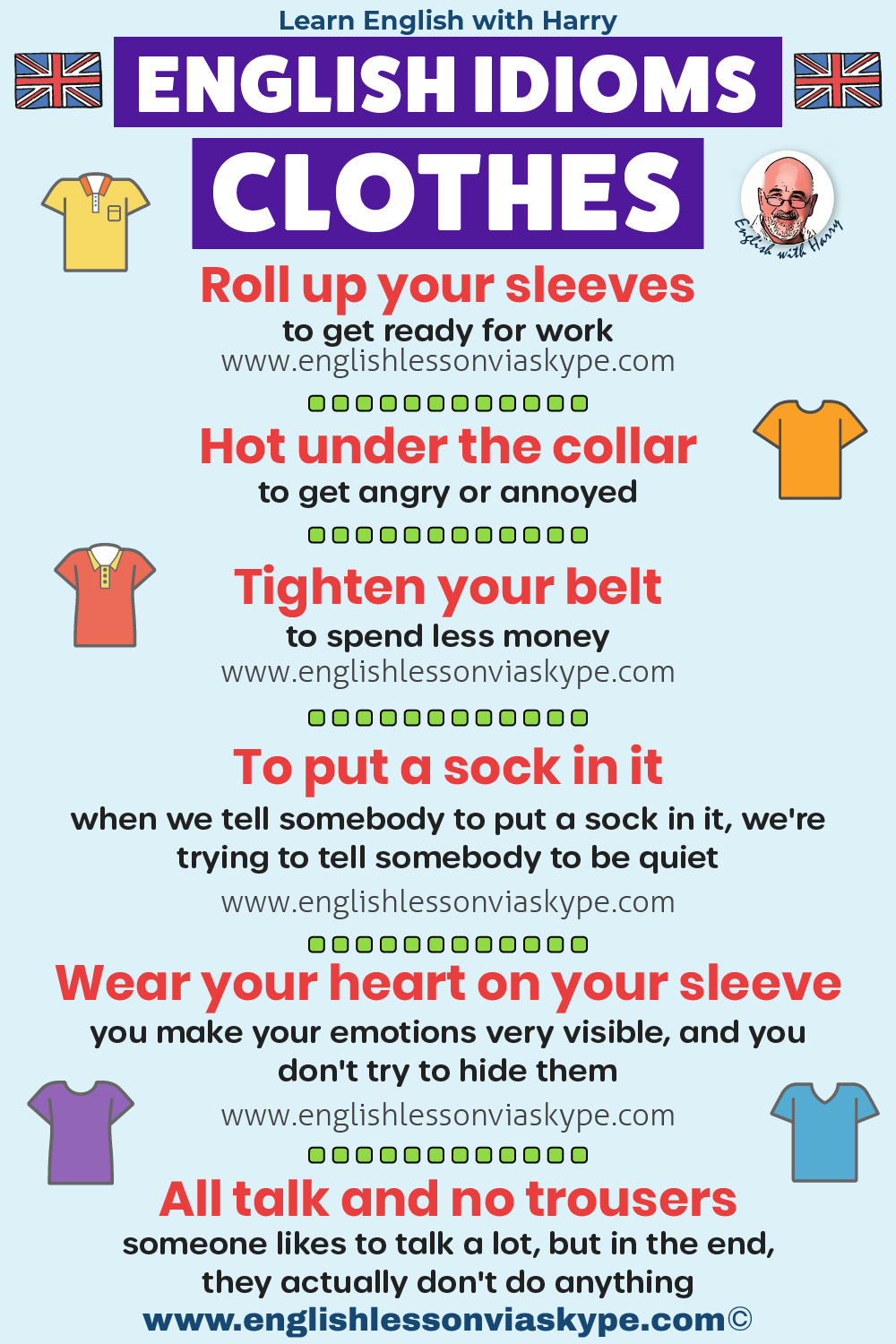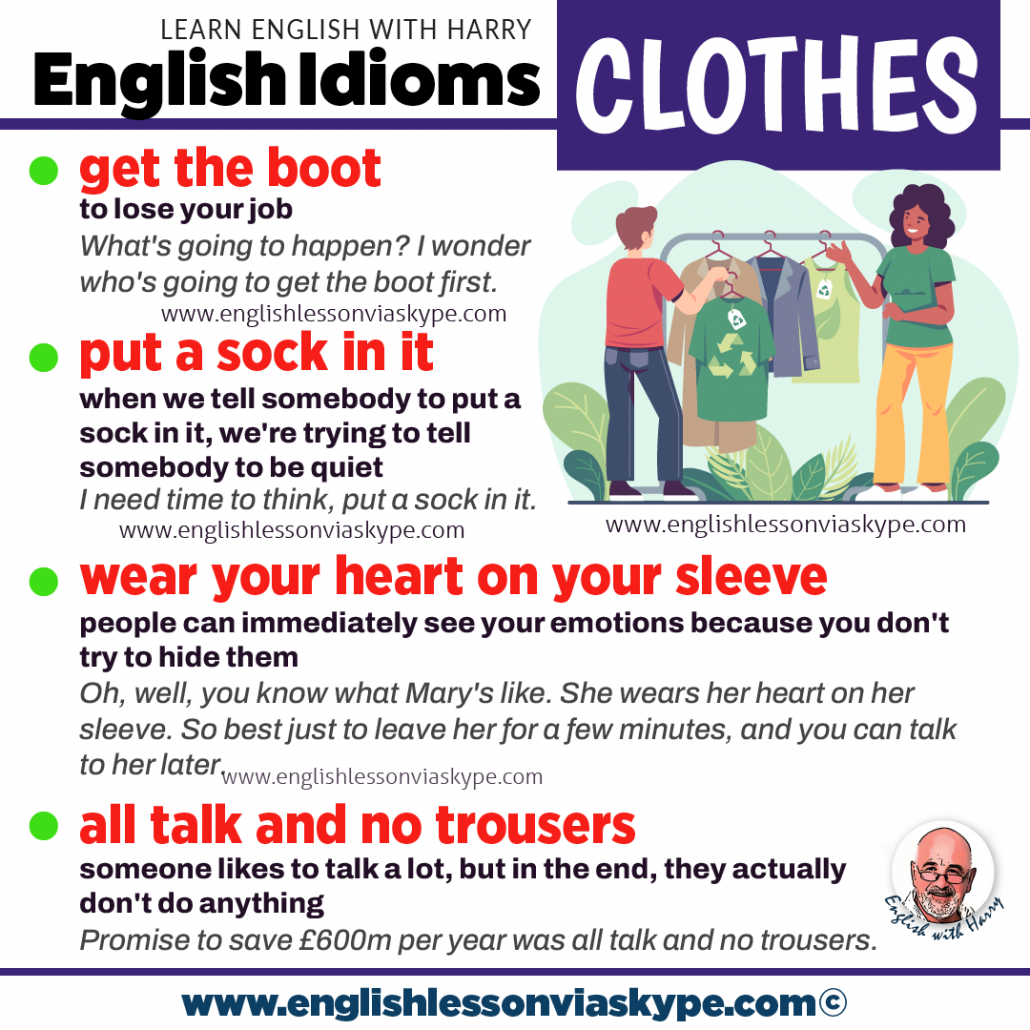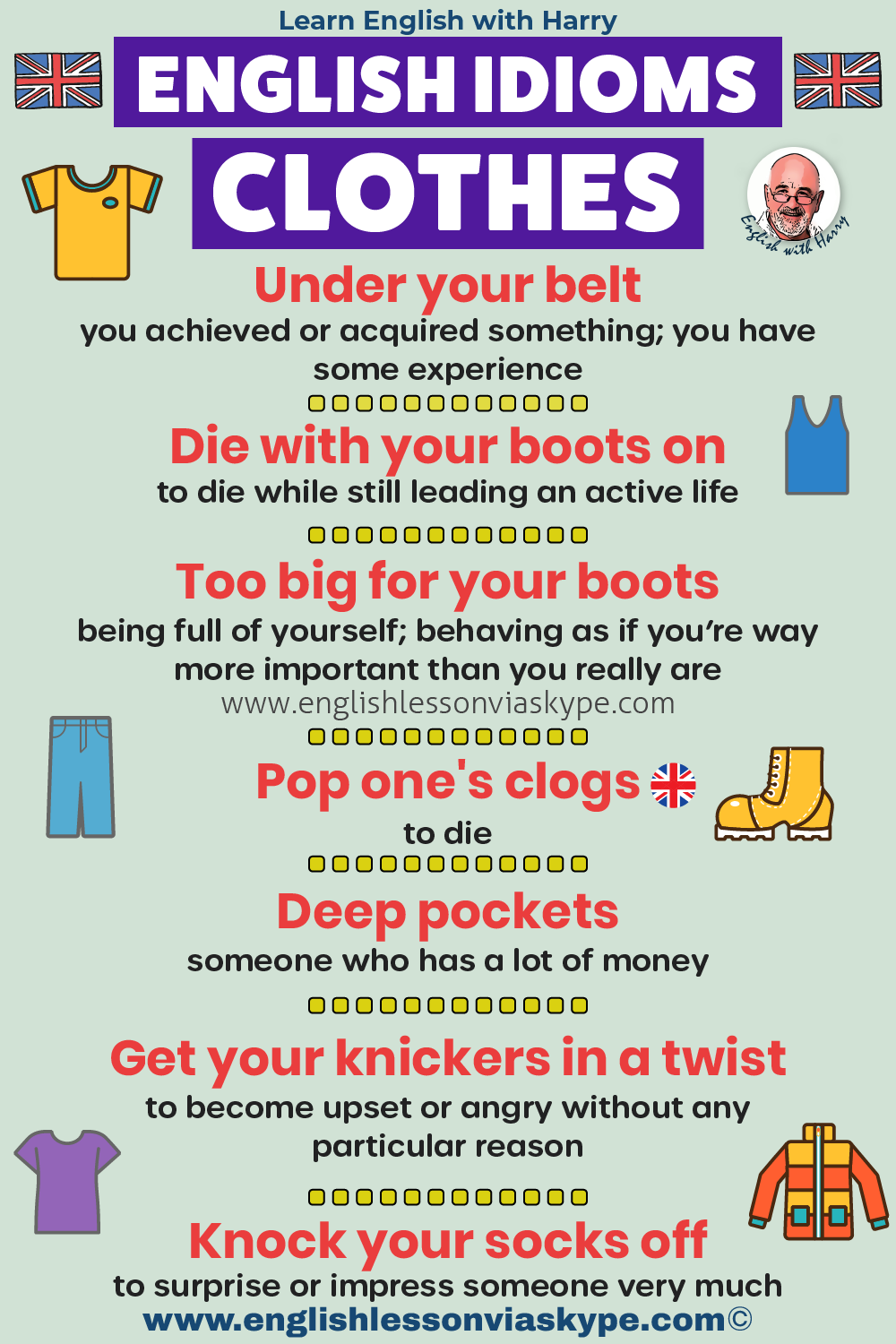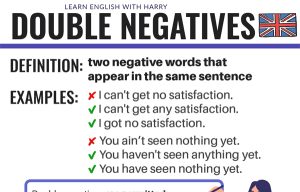Learn English idioms with clothes. Hot under the collar, get your knickers in a twist, tighten your belt and more.
Listen to Speak Better English with Harry podcast episode on all major apps. Scroll down to read the transcript.
Speak better English with Harry - Episode 307
list of clothes idioms
Harry
English Idioms with clothes

Hi there, this is Harry and welcome to my English learning podcast Speak Better English with Harry, where I try to give you a better understanding of the English language.
I help you with your English conversation, your business English, perhaps English needed for interviews.
We can help you improve your English grammar or pronunciation, and all other aspects. I’ll give you my contact details at the end of the podcast episode.
If there’s somebody you feel might benefit from this, and you want to pass the details on. Or, indeed, if you want to contact me yourself.
improve english on a budget
Online English Courses from €7.99
So what are we going to talk about? Well, in this particular podcast, we’re going to talk about clothes. And in particular, we’re going to refer to English idioms with clothes. So as I always do, I’m going to give you the list of the particular clothing idioms, one after the other. Then I will go through them and give you some examples.
Okay, let’s get started. Here we go.
- roll up your sleeves
- hot under the collar
- tighten your belt
- put a sock in it
- wear your heart on your sleeve
- out of pocket
- get the boot
- all talk and no trousers
- get your knickers in a twist
- knock your socks off
Okay, so they’re the idioms about clothes. Some of them are a little bit strange, but I’ll explain them and hopefully, you’ll understand them.
Okay, the first one is quite simple.
roll up your sleeves
The sleeves are what cover your arms. Your left sleeve, your right sleeve. And when we say to roll up your sleeves, it usually means we’re going to begin working.
So when you see movies of people who are using their hands, the first thing they usually do is roll up the sleeve so that it doesn’t get dirty. It’s a sign that they’re going to begin some work. So a plumber or a carpenter, they’ll roll up the sleeves, and then they’ll do the work. Immediately after they finish their work, they unroll the sleeve. Or they put it down, and they fasten the buttons on the left and the right slave. And off they go. So that’s literally what it means.
And when we talk about it figuratively, to roll up your sleeves means to get stuck in.
Okay, so if somebody is slacking and not doing or not working so hard to say, I think we need to roll up our sleeves here because we’ll never get this work done by the deadline day.
So we all pull together, roll up our sleeves, and let’s start working.
You can even say to children who are getting ready or prepared for an exam.
Well, I think you’ve taken enough time off. Now is the time to roll up your sleeves, get your head down in those books, and get ready for that exam.
Okay, so to roll up your sleeves, get ready for work. A bit difficult to roll up the sleeves if you’re wearing a short-sleeved shirt.
The action of rolling up the sleeves is a little bit old fashioned because short sleeves didn’t exist 100 years ago when people always had long sleeves and they always had either a button or, in many cases, they had cufflinks, so they would roll up the sleeves or nothing would get damaged or dirty. Roll up your sleeves.
The next one
hot under the collar
The collar is the top part of the shirt where the tie goes and you button it around the neck.
If you’re feeling a little bit warm, you often see people pull in at the collar to try and make themselves a little bit more comfortable. Particularly in hot summer weather as we have at the moment. So that’s the literal meaning of it.
When somebody gets hot under the collar, it means either getting a little bit anxious, or they’re getting a little bit angry. You can imagine steam or hot air coming from the collar. In a lot of comics, when you see somebody getting angry, you will physically see steam coming from under the collar and people say,
Oh, he’s getting a bit hot under the collar. He’s getting angry or annoyed.
or
Don’t get hot under the collar when I tell you this meaning. Don’t get angry or don’t get annoyed.
So when we use the expression hot under the collar, we’re referring normally to anger. So somebody is going to get a little bit red in the face and you can see the steam rising. So hot under the collar.
English Idioms with clothes

Share and help other students to improve English language skills.
Next
to tighten your belt
Well, many people (not everybody) wear a belt around the trousers so we call it a trouser belt. It’s used to make the trousers a little bit more to sit more comfortably on your body. So the trousers, in particular, are a little bit loose. You use the belt and you put a few holes in it, and then that will keep the trousers sitting in the right position.
When we have to tighten our belt, it means that we have to make it a little tighter so that the trousers don’t slip or fall down. That’s usually because somebody perhaps has lost some weight.
When people lose weight, the trousers don’t fit so well. So the belt needs to be tightened to make sure they stay up. And again, that’s the actual meaning of it.
If we talk about it figuratively, when you tighten your belt, it means that you have to spend less. If you spend less, you usually spend less money on food. And as a result, you might lose weight. And as a result, your trousers may not fit you any longer. So to pull your belt in or tighten your belt means stop spending so much money. Perhaps because you’ve got an economic problem or a financial problem.
So somebody loses his job, and he comes home. And he tells his wife and the family,
Well, look, the company was in a bit of difficulty. They’ve sacked some people, one of those people happens to be me. So for the next few weeks, until I get another job, we’re going to have to tighten our belts.
Meaning we’ll have to spend less on extras, we might have to spend less on the food bill, there’ll be no visits to the cinema, whatever it might be until I get the opportunity to get a new job.
So we’ll tighten our belts. And hopefully, I get back on my feet in a short while. So tighten the belt, pull it in a little bit, make those trousers fit you a little bit better. Okay? So tighten the belt.
English Idioms with clothes
Next
to put a sock in it
So when we have a gap in the window, or in a door where the wind is blowing through, we often need to plug that gap to block it so that the wind doesn’t blow so you can put a piece of paper in it. Or indeed, you could put a piece of material like a sock, and the wind won’t blow, and you won’t hear any noise from the other side. Okay, so the literal meaning of it.
When we tell somebody to put a sock in it, we’re trying to tell somebody to be quiet.
If somebody’s talking constantly, and you can’t get a word in to make your point, or you’re fed up listening to their complaints, you say,
Look, just put a sock in it. Will you please be quiet?
Or will you please shut up?
Or will you please stop talking and talking? Yeah, so just put a sock in it.
We might say to the kids who are complaining,
👱 What’s for dinner? No, not, again. We always have that, why can’t we have something different?
👩🦳 If you want to cook something yourself, you know where the cupboard is, and there’s the stove, you can do it. But if you want me to cook, then you’re going to have to accept what I cook. So just put a sock in it for the moment, go off and do something else. I’ll call you when dinner is ready.
So put a sock in it.
Now, it might literally mean putting your socks in your mouth. In which case, if you put something like that in your mouth, nobody can hear you. And you might see a situation in a movie where somebody has been kidnapped. And the first thing the kidnappers do is take some material, they stick it in the person’s mouth, and the person can’t be heard.
So that is another meaning of ‘to put a sock in it.’
Meaning you stop somebody talking.
So literal meaning and then a metaphorical meaning put a sock in it, please, be quiet, please stop talking.
I need time to think, put a sock in it.
book your trial English Lesson
to wear your heart on your sleeve
It means that you’re very emotional. People can immediately see your emotions because you don’t try to hide them. Therefore everybody is aware when you’re upset. Everybody is aware when you’re angry. Everyone is aware when you’ve got something on your mind because you wear your heart on your sleeve. You make these emotions very visible, and you don’t try to hide them.
So in a situation where somebody has had an argument with their partner or an argument with somebody in the family, and you can see that they are physically and visibly upset either they have been crying or they are very emotional. They say
Oh, well, you know what Mary’s like. She wears her heart on her sleeve. She doesn’t try to hide things. So best just to leave her for a few minutes, she’ll come around, and she’ll get something worked out. And then you can talk to her later.
Okay, or somebody will speak their mind. And, you know, they are very emotional about their job and very emotional about the school work.
You know what he’s like; he wears his heart on his sleeve. He will always tell you what he feels.
He might not even be able to put it into words, but you’ll understand that he’s upset. You’ll understand that he’s a bit emotional about it. So just leave him; he’ll come around to our way of thinking a little later on. To openly show emotions, not in any way try to hide them. So everything is visible to everybody.
out of pocket
When you put your hands in your pocket, you might have car keys, house keys or some money. Pocket is the usual place for people to keep money when they have money. Nowadays, we use all these different apps and therefore cash, or coins, or money is not so frequently seen. But when we had money, we would keep it in a wallet or a purse, or loosely in our pockets. Okay.
So when we are out of pocket, it usually means that we have no money or less money than we thought, or we have spent money that we didn’t expect to spend again.
Let me try and give you an example.
Your boss asks you to visit a customer, and he’s not so sure whether this customer will become an actual customer, perhaps it’s only just some lead that you have. So you go to meet the customer and you discover that it really isn’t suitable for your business. You tell him that, but it’s taking you an hour or two drive there, and you’ve sat down and spoken to him for a couple of hours. And in the end, you realise this really isn’t so appropriate. And the customer might say,
I’m really sorry for wasting your time, perhaps I can pay you for your time because I don’t want you to be out of pocket.
Or it could be something to do where you are doing some work for, let’s say, a friend or a relative. And you said that you’ll help them to decorate the house. So you bring some paint and some paintbrushes and some cleaning material. And you paint the wall or the room or the door. And when they come home and they look and say
Wow, you’ve done a really, really good job of that. I mean, that’s really so professional, I can’t thank you enough here. Let me pay you for your expenses because I don’t want you to be out of pocket.
To be out of pocket is when you spend money on something you didn’t expect to, or it costs you more than you thought it would. As a result, you have less money, so you’re out of pocket.
English Idioms with clothes

The next one on my list of English idioms with clothes is
to get the boot
The boot is like a shoe, it’s on the end of your foot. And if somebody gives you a kick with the boot, it can be quite painful. For example, when somebody gets kicked out of a restaurant, it means they are asked to leave. If somebody gets kicked off the team, it means that the coach drops them or tells them that they’re no longer wanted, okay?
But when we get the boot, it specifically refers to a job where we get the sack; or we are told that there is no job for us.
So the boss walks into the meeting and he says,
Okay, guys, we have a serious problem, we’re going to have to reduce the staff by 10 or 15%. And we’ll get in touch with you one by one to let you know what the situation is. He walks out, and then everybody starts talking to each other. Oh my god, what’s going to happen? I wonder who’s going to get the boot first.
Meaning who is going to lose the job first.
So to get the boot means to lose your job, to get the sack.
Now, often people get the boot very quickly for something they’ve done. Either they didn’t really become so successful during the probation period, or they made some serious mistake in the job. Or they insulted the boss, and then we say,
Oh, yeah, he got the boot last week. He really wasn’t working out.
You could also use it in the sense of your favourite football team.
They’ve lost five or six games in a row. There’s a bit of pressure on the manager. I guess he is going to get the boot.
Next, this is a funny one
all talk and no trousers
A very British English expression. When somebody is all talk and no trousers, it really means that they like to talk a lot, but in the end, they actually don’t do anything. They’re all talk, but they don’t really follow up with action. Okay.
You make a lot of sounds and gestures, and promises and threats, but in reality, you never follow it through.
English Idioms with clothes
Next
to get your knickers in a twist
Well, ‘knickers’ is the slang word or very, very informal word for underwear, particularly ladies underwear. So when people refer to getting your knickers in a twist, it means that you’re going to be a little bit uncomfortable. To twist something means that they’re not straight. So when people metaphorically get their knickers in a twist, it means they get very annoyed or very angry or very flustered.
What’s happened? Why did you do that? How are we going to get out of this?
Look, relax, relax, don’t get your knickers in a twist. Everything will be okay. I’ll talk to him and sort this out.
Now, it might sound a little bit non PC at the moment to be referring to knickers in a twist because they are very specific to ladies underwear. However, we use it in reference to men and women.
So we’ll say to some guy,
Look, don’t get your knickers in a twist. It’s not the end of the world. It will sort it out.
Or
You know what he’s like? He’s always getting his knickers in a twist. He’ll come in shouting and screaming. And in two hours, he’ll have forgotten all about it.
So when somebody gets their knickers in a twist, they get a little excited. They get a little bit anxious, they start screaming or shouting or a little bit out of control. So somebody might say,
He always gets his knickers in a twist. He’s not able to deal with that sort of stressful situation.
Okay, so to get your knickers in a twist. Some people also use a similar expression, and they say
don’t get your undies in an uproar
It has the same meaning, but it’s not used so often.
‘Undies’ is a slang word for underwear.
‘An uproar’ means to get excited and out of control.
And then finally we have
knock your socks off
It means something will be so exciting that you’ll be so surprised that your socks will come off.
Wait, let me tell you the news. This will really knock your socks off. Remember the guy in school always messing in the classroom? He’s now a multimillionaire. He invented an app. He sold it to some software company. He’s sitting back now laughing at us because he’s got lots and lots of money.
That’s the news that will knock your socks off. So it’s really something that will make you sit back and think,
Wow, we got him so wrong.
So something exciting, something very, very newsworthy, something you are not really expecting will knock your socks off.
It could also be a holiday of a lifetime.
You win some competition and you get a trip around the world.
That will really knock your socks off. Imagine winning that? Now you can take three weeks off and travel here, there and everywhere at somebody else’s expense. That sort of prize would really knock your socks off.
Okay, so they are my English idioms with clothes. Let me give them to you one more time.
- roll up your sleeves
- get hot under the collar
- tighten your belt
- put a sock in it
- to wear your heart on your sleeve
- to be out of pocket
- to get the boot
- all talk and no trousers
- get your knickers in a twist
- knock your socks off
Excellent. Hopefully, you understand these English idioms with clothes. And hopefully, you get a chance to use one or two of them in your English speaking.
If you want to contact me, you can get me on www.englishlessonviaskype.com
Very happy to hear from you, very happy to get any suggestions on what you might like me to include in future podcasts.
If you want individual English lessons, either to do with pronunciation, grammar, or to get yourself to the advanced English level; please contact me. We offer quality online English lessons over Zoom or Skype.
I appreciate you listening to me. Join me again soon.
More information
For more information on English grammar rules, English collocations and English idioms, check out the links below:
English vocabulary for EMOTIONS
You can always study English advanced level at Learning English with the BBC.
You will love these English lessons

Double Negatives In English Grammar
Learn how to use double negatives in English grammar. Double negatives are often used in movies and songs, but grammatically


English Travelling Collocations
Here you will learn English travelling collocations. These useful expressions will help you improve your English speaking skills when you’re


Useful Phrases For Business Negotiations in English
Here you will learn useful English phrases for business negotiations in English. These business English expressions will help you feel

